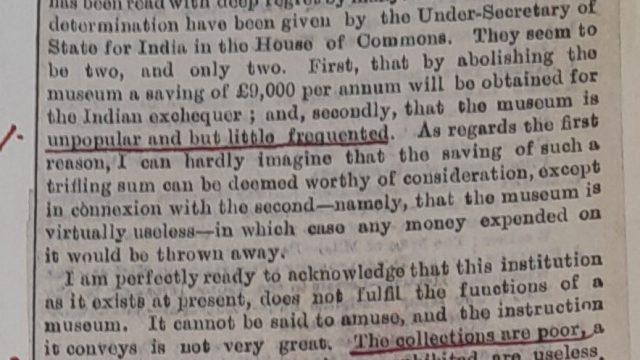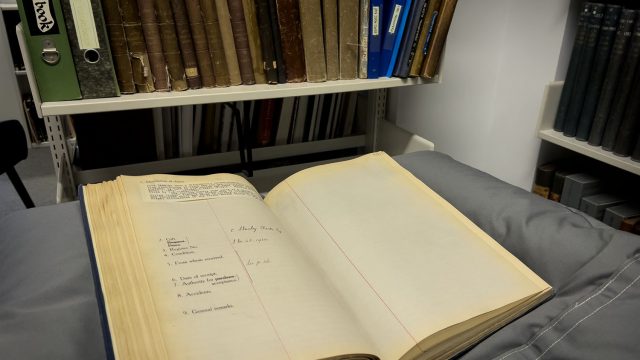Sir Ken Dodd is one of the UK’s greatest comedians and entertainers. Today he celebrates his 90th birthday and can still be seen performing in theatres up and down the UK bringing happiness to all with his trusted Tickling Stick and Diddymen. Senior Curator Simon Sladen spoke to him about his career and thoughts on comedy, which we’re delighted to share with you on this very special day. Happy Birthday Sir Ken!
Somebody once said that there are only five, six, seven, original jokes. I think what they meant is that there are five or six concepts to provoke, to create, laughter.
If you learn the rules of humour I think you can develop the skills [to be a comedian] to a certain extent. But to really be a good comic, to be a good humourist, to be a good laugh-provoker, I think you need to have an imp inside you. There’s a comic imp in all the good comedians, the great ones.
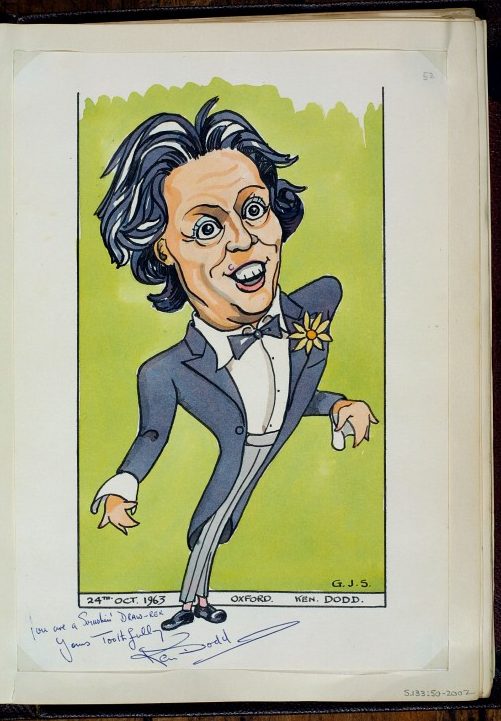
There are different styles of comedy. One of them is a peculiar style of comedy called drollery and it’s very English, I’m proud to say. The droll is more of an actor than a comedian, because he sort of acts or pretends he doesn’t really see the joke or he doesn’t see what’s funny.
I used to go to a second hand clothes shop in Liverpool called Jane Canoldson, I [bought] an old tailcoat there and baggy trousers. Inside, the label said the Earl of Derby. My dad gave me the name Professor Yaffle Chucklebutty. I had cards printed: ‘Professor Yaffle Chucklebutty, Operatic Tenor and Sausage Knotter’. That was my idea of what was funny. Even then I hid behind a character before I could tell the jokes.
When I was about 14 or 15, I wanted to know what a joke was. My dad, Arthur, was a very clever man. One of his theories was: if you want to know something, go to the library. So I went to the one in Liverpool and I looked up laughter, humour, comic, comedians in the reference catalogue – and [did that in] each town I went in, whenever I was on tour. Gradually, I fell in love with this wonderful thing called humour and I devoured all the books I could on people who examined humour, and thought about humour.
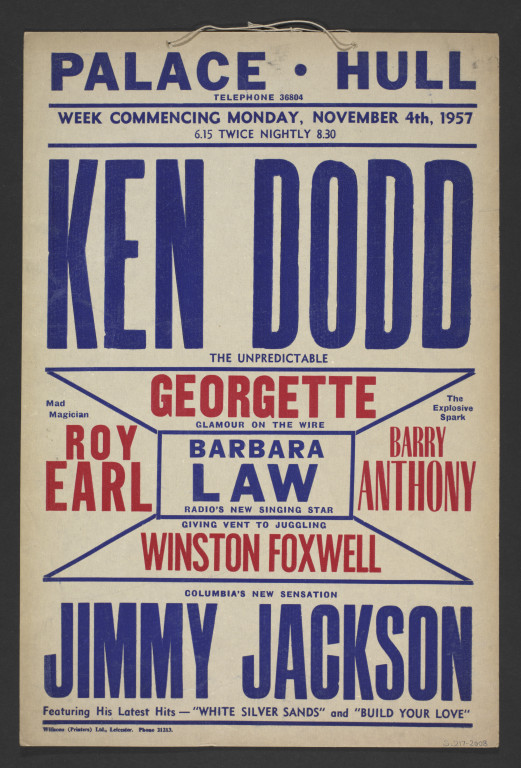
There is such a thing as dark humour, there’s satire. Satire should be like a surgeon’s scalpel, should cut out all pomposity and a lot of the other things that are not very nice in life.
To me, a sense of humour is a sense of seeing the funny side of life. The sense of seeing the information that your mind gets and looking at it from a different angle. Everybody is born with a play spirit. Alas, unfortunately, as you go through life and life’s disappointments and struggles attack you, some people lose their playfulness.
A good comedian gets laughs, a great comedian gets laughter and applause and a really, really great comedian is loved.
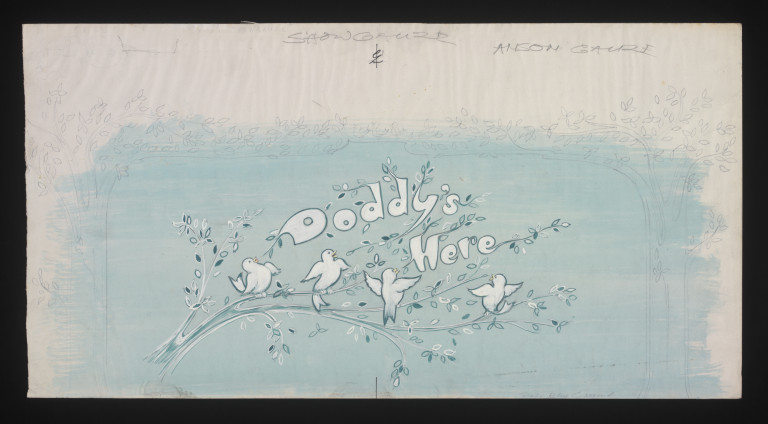
S.1233-2015
Humour hasn’t changed, audiences have changed. There is a lot of dark humour coming out now. When I first started in 1954-55, you had to submit your script to the Lord Chamberlain’s office and they would go through it would a blue pencil. If you did anything which was particularly vulgar, you would be told to take it out. Now, it seems that anything goes. Worse than that, anything does go and will go and must go. I think that sometimes they go too far.
The doctor gags never fail. We seem to find it hilarious the things we’re afraid of. There’s lots and lots of jokes about funerals and services. Lots of jokes about snuffing it, a lot of jokes about being in hospital.
When you’re on the stage and do your act and you know it backwards and forwards and sideways, sometimes you start thinking about other things like what’s for supper – there’s another part of your brain that’s working. I’ve actually stood on the stage and heard myself tell jokes that I’ve never heard before.
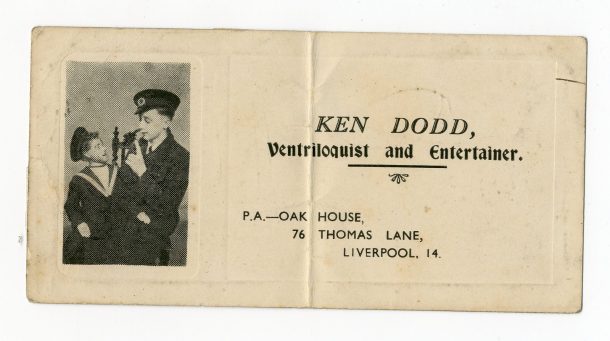
Don’t tell the audience this, but you’re really using them. Each audience is like a work in progress, it’s like a laboratory. Every show I do, I try to do six new gags. Sometimes they’re a one liner, sometimes it’s a story, sometimes it’s a piece of comic business, visual. But every show I do, I try at least six. That’s one of the joys of performing, it’s like bungee jumping, you’re not quite sure what is going to happen.
I thought I should have a notebook and make little post-show notes about how each joke was received. Over the years I’ve had all these notebooks and they took the name of a Giggle Map. The Giggle Map of Great Britain.
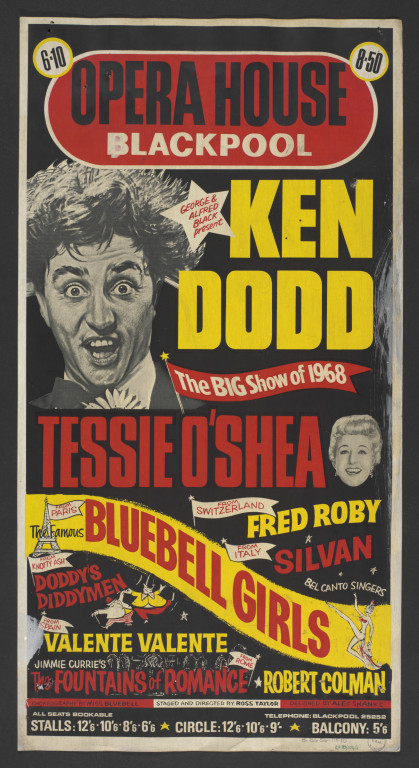
Poster advertising the Big Show of 1968 at the Blackpool Opera House starring Ken Dodd and his Diddymen, Tessie O’Shea and the Bluebell Girls, S.3656-1995
Television is extremely difficult for a comedian because it’s not natural. A studio audience is nothing like a theatre audience. A theatre audience you work on like a sculptor and you build the performance. Actors have the fourth wall that [they’re] told to ignore. 99% of plays are written so that you ignore the audience and you just carry on with the story.
My favourite theatre is the one I’m playing tonight. Or the one I’ll be playing tomorrow night. It’s got to be. To give your best, it’s got to be the one you’re doing now.
I’d like to leave my thoughts on comedy to pass on to other people who were interested in humour or wanted to be a humourist, wanted to be a comedian, as a performer or a writer, in years to come. I have a collection of books, scripts and stuff… I would love to have in Knotty Ash [in Liverpool] – nowhere else – a Ken Dodd humour archive.
There will always be laughter inside human beings and there will always be performers of comedy and humour – please God – that will use, perhaps, some of the old rules and ideas of comedy. I think it would be wonderful if we could pass any thoughts we have on. Maybe like the academy of dramatic arts there might be an academy of comedians!
Article edited by Corinne Jones.
To find more examples of comedy in the Theatre and Performance Collections visit Search the Collections.
